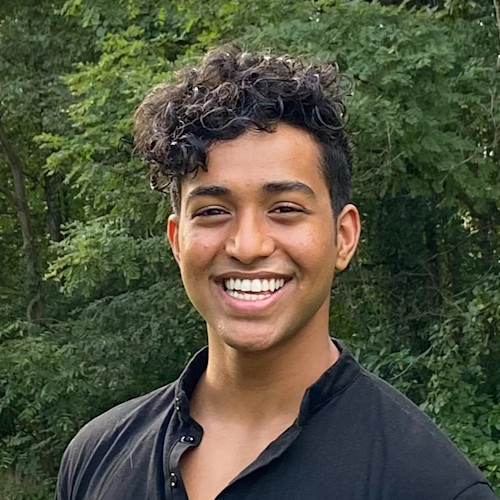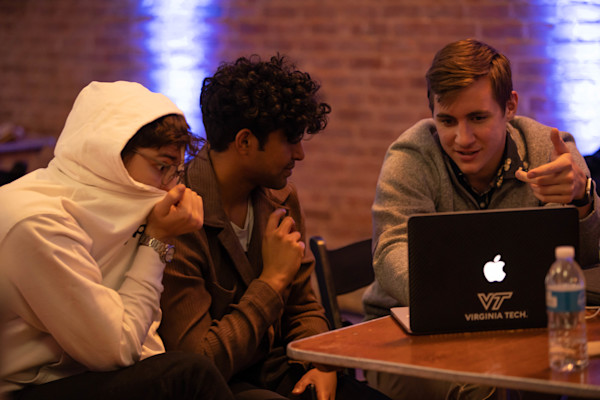Akshay Akula, 21

Akshay Akula grew up with a passion for creating things, but never imagined himself as a programmer. He recalls building a rudimentary motor using a magnet, paper clips, and some copper wire in the 3rd grade, and the feeling of “pure wonder” at watching it burst into motion. By the time Akshay graduated high school, he was dead set on pursuing a degree in mechanical engineering at Virginia Tech. At the time, Akshay says the only coding he knew was basic Java.
Freshman year is always full of surprises, however. While Akshay was eating in his university’s dining hall, his friend and former soccer teammate, Naman Singh, approached and invited him to participate in his first hackathon, VTHacks. Akshay says he “relentlessly learned Java” in the two days left before the event. Inspired by mentors at the hackathon, who he says “were like my idols,” Akshay changed his major to computer science and hasn’t looked back.
Crediting his first hackathon experience with being “the one event that imparted in me the confidence and knowledge that I can build anything if I put my mind to it,” Akshay was hooked. He attended the Virginia Commonwealth University’s 2019 HealthHacks shortly after. In the last three years since attending his first hackathon, Akshay has won both VTHacks and HooHacks, and competed in many other hackathons, including DevRev, Chainlink Hackathon, and Polkadot Hackathon.
Akshay says although he loves competing in hackathons, his “real draw is the ability to teach and help others with coding.” The summer after his freshman year of college, when Akshay first decided to teach coding to new hackers, he left posters advertising free Java tutoring all over his neighborhood. Akshay’s first student was nervous and struggled with confidence in his coding, but Akshay persevered and changed his lesson plan completely, letting his student draw out blocks of code to understand how they worked. He has since found other ways to share his love for coding, encouraging others to attend hackathons and even teaching full stack development on the side. Akshay says he just loves to see people “realize their ability to build.” To him, helping to build a hacker community at Virginia Tech has been the “most powerful and fulfilling form of building.”
“The hacker community means so much to me,” Akshay says, adding “I want to be like the mentors who inspired me.” Wanting to be more involved with the hacker community, he founded the club Blockchain at Virginia Tech, which already boasts more than 100 active members. Next year, Akshay’s club will be hosting its first hackathon, which he says will be “focused on blockchain development and learning.” Despite the club starting only recently, in September of 2021, it has grown tremendously over the last ten months. Blockchain at Virginia Tech has already partnered with five local corporations, participated in more than twenty events, and placed 2nd in Blockchain@Columbia’s LionHACK. To date, however, Akshay believes the club’s biggest accomplishment has been “making lifelong connections and discovering and sharing our spark for blockchain technology.”
Quick Facts

Akshay Akula, 21

Akshay Akula grew up with a passion for creating things, but never imagined himself as a programmer. He recalls building a rudimentary motor using a magnet, paper clips, and some copper wire in the 3rd grade, and the feeling of “pure wonder” at watching it burst into motion. By the time Akshay graduated high school, he was dead set on pursuing a degree in mechanical engineering at Virginia Tech. At the time, Akshay says the only coding he knew was basic Java.
Freshman year is always full of surprises, however. While Akshay was eating in his university’s dining hall, his friend and former soccer teammate, Naman Singh, approached and invited him to participate in his first hackathon, VTHacks. Akshay says he “relentlessly learned Java” in the two days left before the event. Inspired by mentors at the hackathon, who he says “were like my idols,” Akshay changed his major to computer science and hasn’t looked back.
Crediting his first hackathon experience with being “the one event that imparted in me the confidence and knowledge that I can build anything if I put my mind to it,” Akshay was hooked. He attended the Virginia Commonwealth University’s 2019 HealthHacks shortly after. In the last three years since attending his first hackathon, Akshay has won both VTHacks and HooHacks, and competed in many other hackathons, including DevRev, Chainlink Hackathon, and Polkadot Hackathon.
Akshay says although he loves competing in hackathons, his “real draw is the ability to teach and help others with coding.” The summer after his freshman year of college, when Akshay first decided to teach coding to new hackers, he left posters advertising free Java tutoring all over his neighborhood. Akshay’s first student was nervous and struggled with confidence in his coding, but Akshay persevered and changed his lesson plan completely, letting his student draw out blocks of code to understand how they worked. He has since found other ways to share his love for coding, encouraging others to attend hackathons and even teaching full stack development on the side. Akshay says he just loves to see people “realize their ability to build.” To him, helping to build a hacker community at Virginia Tech has been the “most powerful and fulfilling form of building.”
“The hacker community means so much to me,” Akshay says, adding “I want to be like the mentors who inspired me.” Wanting to be more involved with the hacker community, he founded the club Blockchain at Virginia Tech, which already boasts more than 100 active members. Next year, Akshay’s club will be hosting its first hackathon, which he says will be “focused on blockchain development and learning.” Despite the club starting only recently, in September of 2021, it has grown tremendously over the last ten months. Blockchain at Virginia Tech has already partnered with five local corporations, participated in more than twenty events, and placed 2nd in Blockchain@Columbia’s LionHACK. To date, however, Akshay believes the club’s biggest accomplishment has been “making lifelong connections and discovering and sharing our spark for blockchain technology.”
Quick Facts




